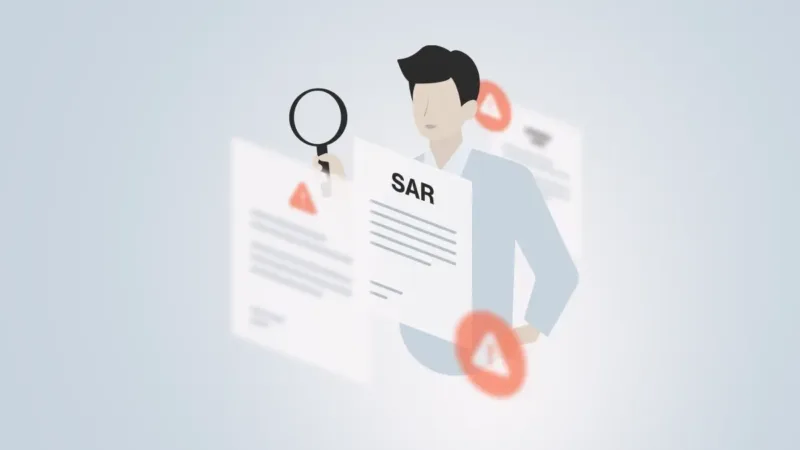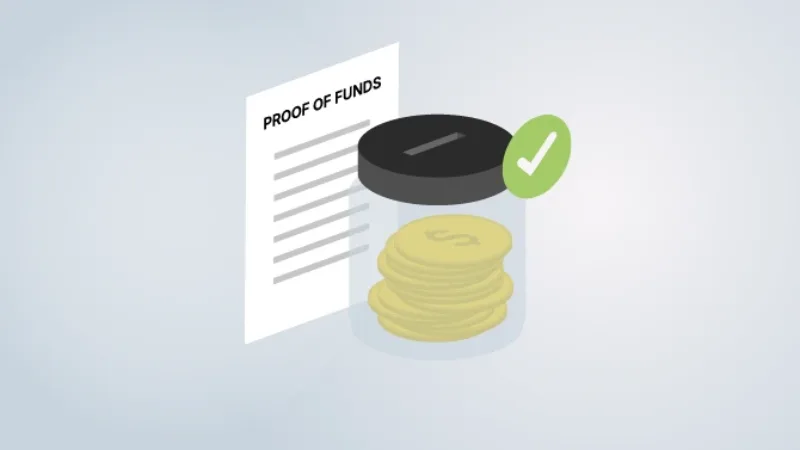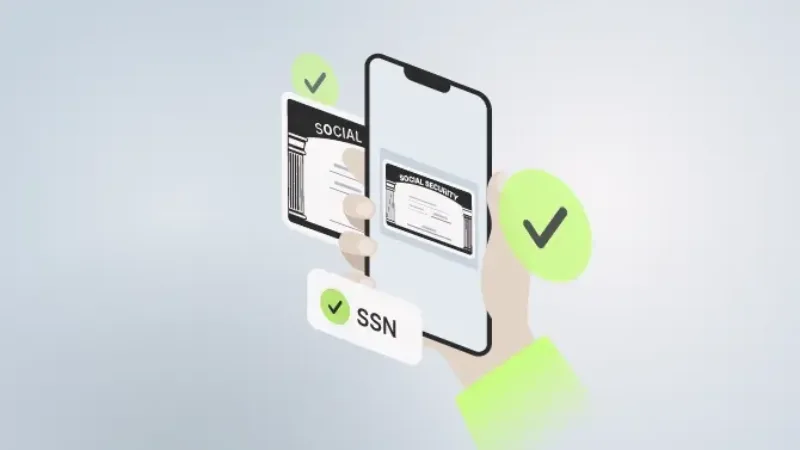What is Ultimate Beneficial Ownership (UBO)?
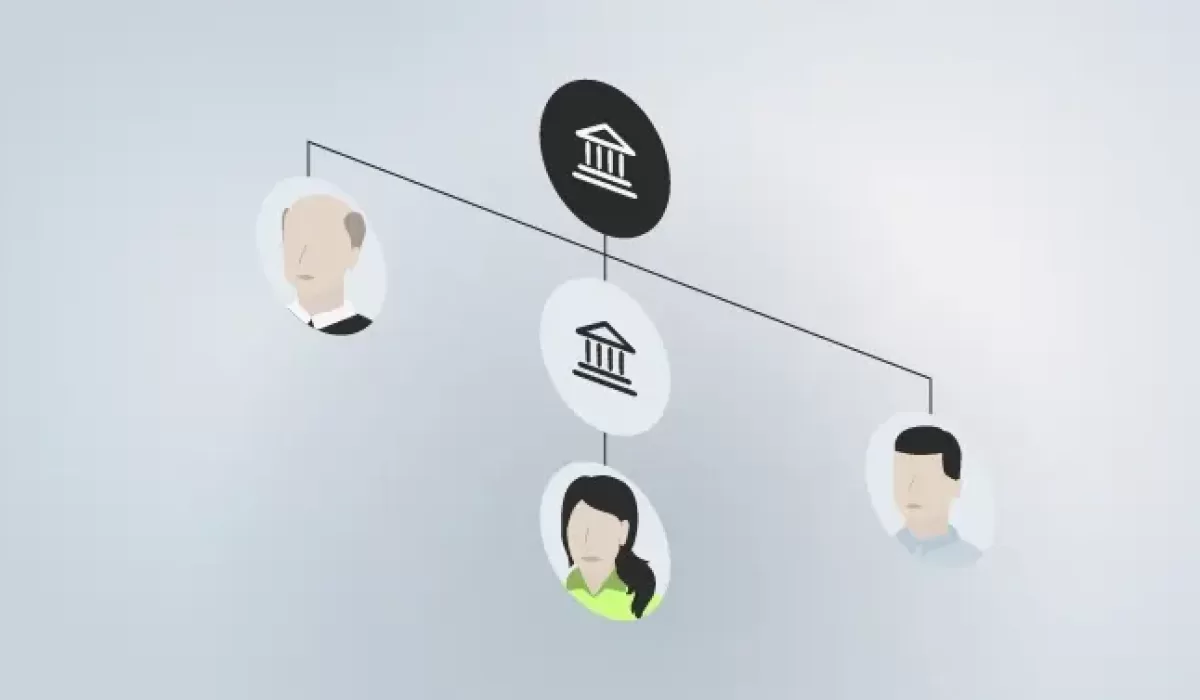
Understanding Ultimate Beneficial Ownership (UBO) has become more critical than ever. Global regulators are tightening the reins, pushing for full transparency around who truly controls and benefits from corporate entities. As 2025 unfolds, organizations such as financial institutions that fall short of UBO compliance risk more than fines, they risk reputational damage and losing the trust of partners and clients.
What is an Ultimate Beneficial Owner (UBO)?
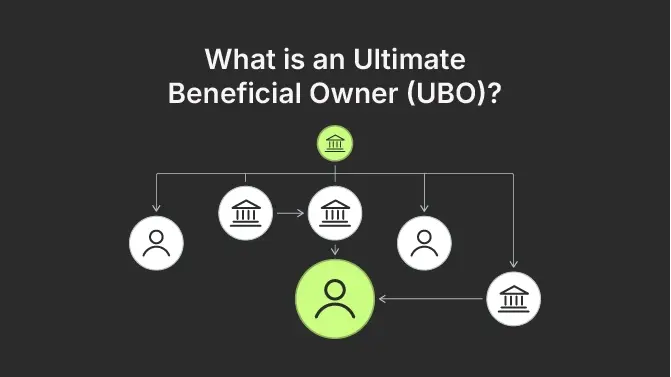
An Ultimate Beneficial Owner is the natural person or persons who ultimately own or have significant control of a legal entity, and who benefit from its assets or operations. The emphasis here is on „ultimate” — it is not enough to identify corporate shareholders or parent companies. Regulators require organizations to look through complex ownership structures to find the human faces behind corporate veils.
Typically, a UBO is someone who:
- Directly or indirectly holds 25% or more of shares or voting rights.
- Exercises control over the management or decisions of the entity.
- Benefits from the company’s assets, transactions, or profits.
What is a Reporting Company?
Under the Corporate Transparency Act (CTA), enforced by the Financial Crimes Enforcement Network (FinCEN), a reporting company is any corporation, limited liability company (LLC), or other similar entity that is created by filing a document with a U.S. state or tribal authority, or formed under the law of a foreign country and registered to do business in the United States.
Reporting companies are required to disclose information about their beneficial owners — the individuals who ultimately own or control the entity — to FinCEN. This reporting obligation is intended to prevent the misuse of anonymous shell companies for illicit purposes like money laundering or terrorist financing.However, there are several exemptions. Larger, regulated, or otherwise highly visible companies — such as publicly traded companies, banks, credit unions, insurance companies, and certain tax-exempt organizations — are exempt from the definition of a reporting company under the CTA.
UBO vs BO: What’s the Difference?
You’ll often notice that „ultimate beneficial owner” and „beneficial owner” are used interchangeably. While the definition is similar, there are important differences between these terms.
Both UBO and BO can be described as natural persons with some ownership privileges and shares in the company. Additionally, UBO and BO can gain profits and privileges related to the ownership of shares. However, the main difference is that the ultimate beneficial owner receives a much higher return and exercises significant control over the company.
UBO Identification Criteria
Financial Action Task Force (FATF), the global money laundering and terrorist financing watchdog, has laid out specific criteria to identify beneficial owners of a legal entity:
- Individuals who own at least 25% of the capital or share capital.
- Individuals with at least 25% of the entity’s voting rights
- Persons with the power of attorney
- Legal guardians of minors
- Corporate directors specifically appointed to conceal the true owners
- Holder of anonymous shares, including bearer shares
Who Doesn’t Qualify as a UBO?
Sometimes, a person may hold shares in the company but doesn’t receive any benefits from them. This means a person is not a beneficial owner, no matter how many shares they own.
Shareholder’s benefits include:
- a right to the dividends
- company’s voting rights
- ability to benefit from the value of shares when the share is sold or transferred
When a natural person holds a share for somebody else, they are considered a non-beneficial owner. A non-beneficial owner can be a parent holding shares for their child who is a minor or a trustee who holds shares for the beneficiaries of a trust. It is important to note that using a non-beneficial ownership share-holding structure, such as a trust, allows holding shares anonymously.
Why UBO Matters for Compliance
Regulated entities need to know exactly who they are engaging with. Whether it’s their clients or business partners, validating the true identities of natural or legal persons is crucial to the regulatory compliance process. It also aids in preventing financial loss and protects the organization’s reputation.
According to the UN Office on Drugs and Crimes, global illicit proceeds total more than $2 trillion annually. Establishing the identity of a UBO prohibits a company from engaging in illegal activity, which may seek to avoid legal repercussions by concealing the beneficial owners’ identities. The anonymity allows for tax evasion, money laundering, corruption, embezzlement, terrorism financing, and other crimes. Bringing beneficial owners to light increases transparency and the security of the financial system.
Global UBO Screening Regulations
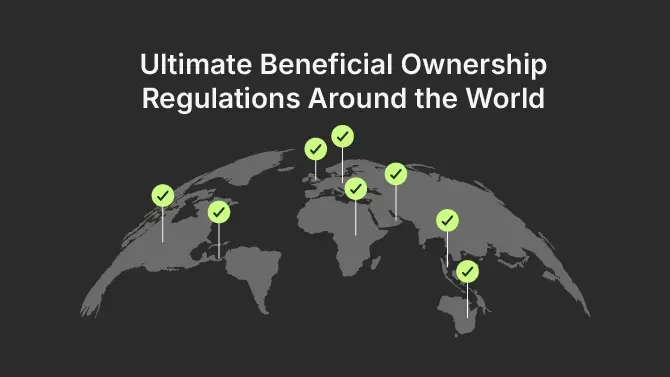
Since the revelations of the Panama Papers and Paradise Papers, governments worldwide have accelerated reforms:
European Union:
Public beneficial ownership registries are now operational in most member states, though access varies following a 2022 ruling from the Court of Justice of the European Union that emphasized balancing transparency with privacy rights. Companies are still obligated to report ownership information, but access to this data may be restricted to those with a legitimate interest.
United States:
The Corporate Transparency Act (effective 2024) introduced sweeping changes, requiring most corporations, LLCs, and similar entities to disclose their beneficial owners to the Financial Crimes Enforcement Network (FinCEN). This disclosure takes the form of the Beneficial Ownership Information (BOI) Report, a mandatory filing that collects detailed personal and ownership information about individuals who ultimately control companies. Non-compliance with BOI reporting obligations can result in severe civil and criminal penalties, including fines and imprisonment.
United Kingdom:
The Economic Crime (Transparency and Enforcement) Act mandates that overseas entities owning property in the UK must disclose their beneficial owners to the Companies House public register. This initiative aims to deter money laundering through real estate and improve corporate transparency.
Global South:
Beneficial ownership reforms are gaining traction across Africa, Asia, and Latin America, as more countries introduce UBO disclosure rules to align with international anti-money laundering (AML) standards. While progress is uneven, the trend is clear: beneficial ownership transparency is becoming a global expectation, not just a regional one.
How to Identify a UBO (Step-by-Step)
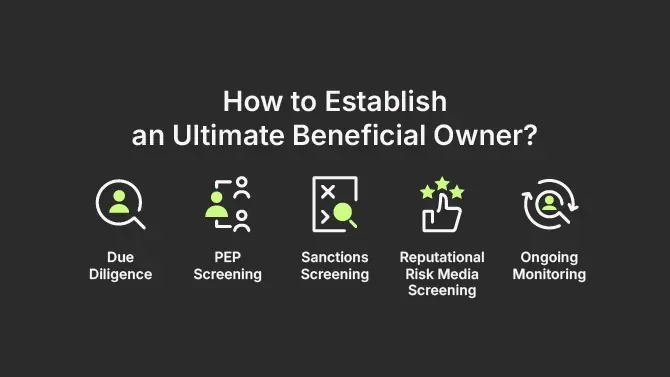
For the UBO check to be efficient, a regulated organization should implement an efficient KYB strategy as part of its AML compliance. The strategy should involve the following procedures: due diligence, PEP, sanctions and adverse screening, as well as ongoing monitoring.
Due-Diligence
Organizations should collect identifying information about their customer entity, such as the names and addresses of company directors. By checking ultimate beneficial ownership information, an organization can establish a company’s ultimate beneficial owners. In case the UBO check results in a high risk score, an organization might need to perform enhanced due diligence before proceeding with business relationships or implementing ongoing monitoring.
PEP screening
As the Panama Papers demonstrated, politically exposed persons may use shell companies to hide their illicit activities. They are also considered to be at greater risk of bribery and other financial crimes. Thus, organizations should screen their clients to establish their PEP status.
Sanctions screening
Sanctioned individuals are more susceptible to the use of shell companies as a way to illegally obtain access to financial services, requiring the organization to screen their clients against sanctions lists.
Adverse media screening
A customer entity’s reputation can be assessed by monitoring adverse news pieces written about it. Media stories can quickly demonstrate a person’s risk status when involvement with criminal activities is uncovered.
Ongoing monitoring
The regulations require performing these procedures not only at the beginning of the relationship with a client but also throughout the whole customer lifecycle. Thus, it’s very important to continue checking relevant registrars for up-to-date ultimate beneficial ownership information.
UBO Identification with Ondato
Tracing beneficial ownership is a complex, resource-intensive process — but it doesn’t have to be. Ondato’s advanced compliance technology empowers organizations to:
Automate KYB (Know Your Business) processes.
Ondato streamlines onboarding and verification procedures by automatically gathering and analyzing corporate data, saving valuable time and minimizing manual errors.
Seamlessly perform due diligence, PEP, sanctions, and adverse media screening.
With integrated screening tools, Ondato ensures that organizations can thoroughly vet entities and individuals against regulatory watchlists and uncover reputational risks from the outset.
Access up-to-date UBO data through integrations with official registries.
Ondato connects directly to reliable national and international databases, offering real-time access to verified ownership information even across complex corporate structures.
Continuously monitor client profiles and alert compliance teams to changes.
Rather than relying on periodic reviews, Ondato enables ongoing monitoring, sending instant alerts when new risks, ownership changes, or sanction hits are detected.
By leveraging Ondato, companies can significantly reduce compliance costs, mitigate risks, and stay ahead of regulatory changes without compromising operational efficiency.
Final Thoughts: UBO & Risk Management
Establishing ultimate beneficial ownership is required by KYB regulations. This procedure is important to bring transparency to your business relationship and prevent money laundering, terrorist financing, and other financial crimes. The process is complex and resource intensive but can be easily streamlined with the help of regtech solutions such as Ondato.
If you’re looking for a scalable way to manage UBO discovery, risk scoring, and KYB onboarding, Ondato’s business verification services offer a complete and automated solution.





